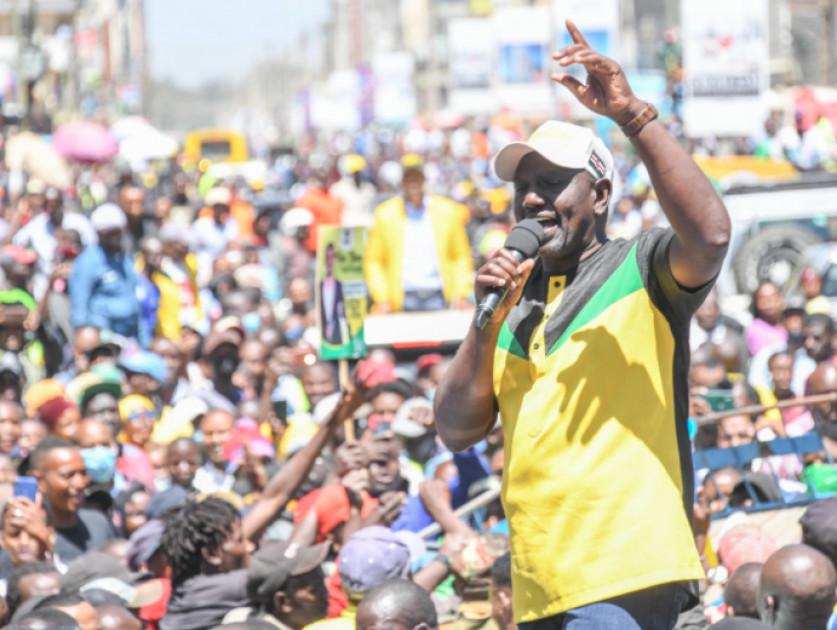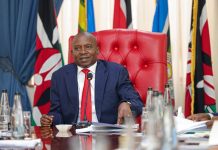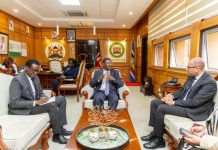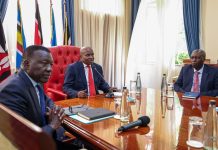Faridah N Kulumba
Africa-Press – Kenya. Kenyan Presidential candidate Deputy President William Ruto 55 years during an economic forum last month promised to deport Chinese in the country who are doing jobs that could be done by Kenyans if he is elected as the president in the coming election.
Economic challenges in Kenya
The August 9 presidential, parliamentary and local elections come as East Africa’s largest economy faces economic hardship, attributed to the Covid-19 pandemic and the Russia and Ukraine war.
Ruto’s promise
DP Ruto vowed to deport the Chinese nationals who come to Kenya disguised as investors and workers, but they end up engaging in small businesses such as street vendors, retail shops, supermarkets, roasting maize on the streets, and other small businesses which can be capably handled by Kenyans.

Chinese national’s effects on Kenya
Chinese have penetrated Kenya right deep into the villages. They have placed all the locals from small businesses. They have even gone ahead and flooded the country with mass-produced substandard products, an issue that worries Kenyan visitors to that country. Another issue is the Chinese sell trades goods and then after the traders have created a market for goods, the Chinese come to Kenya to engage in the same business, selling cheaply and driving the locals out of business.
Behind Ruto’s promise
According to Kenya’s law, there is a level of business that is not allowed for someone to come from a foreign country to do. Kenya like any other country signed bilateral agreements with different countries on what level of business or work is to be done by locals and which work is allowed, where one must have a work permit for foreigners. The hustler of the nation DP Ruto is representing himself as a defender of the ‘resourceful’ ordinary people against the ‘dynasties’ that rule Kenya. He has been critical of President Uhuru Kenyatta’s economic policies, promising to cancel the country’s estimated USD70 billion debt if he wins the election.

China’s benefits to Kenya
China is Kenya’s second-largest creditor after World Bank and has financed infrastructure projects. 4.7 billion for the most expensive infrastructure project since Kenya’s independence in 1963: the train line that links the port city of Mombasa to Naivasha in Rift Valley via the capital Nairobi. However, all of China’s investments in Kenya have often been accompanied by an influx of Chinese workers.
Transforming Kenya’s economy manifesto
On 30 June 2022, DP Ruto launched the Kwanza manifesto at Kasarani Stadium which was anchored on seven pillars aimed to transform the country’s economy using his bottom-up model. Ruto’s promises were focused on many challenges affecting Kenya’s economy that his government will face if elected as the next president and how he will tackle them. These include an employment rate that is estimated at over 60 percent, an economy highly dependent on low productive agriculture (around 30 percent of GDP) with high susceptibility to drought, rising energy and food prices that are now, and much more.
Among the key challenges that will confront the new administration include an unemployment rate that is estimated at over 50 percent; an economy highly dependent on low productive agriculture (around 30 percent of GDP) with high susceptibility to drought; rising energy and food prices that are now beyond the reach of many Kenyans; and about half of Kenyans now living below the poverty line (2019 estimate) worsened by the pandemic.
The bottom-up program
To transform Kenya’s economy Ruto Kwanza’s government is planning to introduce the bottom-up economic model of empowering the people at the bottom of the pyramid the “hustlers.” This plan is people-driven, a deliberately inclusive. A participatory process where citizen participation is at the core of policies, strategies, programs, and projects.
By involving citizens in identifying their social-economic priorities, it ensures that government work meets people’s needs and that public policy is relevant and that government works for people.
Agriculture and food security
The Kenya Kwanza will provide affordable working capital to farmers through a better governed and revitalized cooperative society. They will deploy modern agricultural risk management instruments that will ensure farming is profitable and income is predictable through a well-defined Guaranteed Minimum Returns (GMR) Scheme. Ruto will transform 2 million poor farmers from a food deficit to surplus producers through input finance and intensive agricultural extension support, raise the productivity of the key-value food chain, reduce dependence on basic food imports by 30 percent, revamp underperforming and collapsed export agricultural products, and increasing the supply of quality seeds.
Right to shelter
DP Ruto promised to establish a Settlement Fund, to resettle up to one million desperate landless families on the Coast and other parts of the country. To avoid excessive subdivision of land, the land bought under these schemes will be subject to land use planning where beneficiaries will own transferable residential plots in planned settlement and have a right to lease non-transferable agricultural land.
Micro, Small, and Medium Enterprise (MSME) plan
The new government will work on ending the criminalization of work. This will be done by passing laws, making trading licenses, and provision locations so that whoever applies will have a right. The authorities will work with county governments to provide one street trading premises for every 50 urban residents, with the aim of increasing the average daily income of informal traders by Ksh200 (USD1.69).
Right to health
Ruto promised to deriver a Universal Health Coverage (UHC) system. This will include fully publicly financed primary healthcare, a Universal seamless health insurance system comprising mandatory national insurance, a national fund for chronic and catastrophic illness and injury costs not covered by insurance, and much more.
Women empowerment
If DP Ruto becomes president of Kenya women will be able to participate more in key sectors of the economy. Those who are in informal sectors will be provided with financial and capacity-building support through the Hustler Fund for women-led cooperative societies, Chama, merry-go-grounds, and table banking initiatives and protected from predatory interest rates charged by unscrupulous lenders.
Security service
The Kenya Kwanza government will improve the security sector by putting contributory benevolent funds for families of fallen and terminally ill officers getting them affordable housing mortgages, provide health insurance, and also reviewing and considering improvement of remuneration and terms of service for all officers in the security sector.
Foreign policy
Ruto’s government promises economic and commercial diplomacy, which entails leveraging Kenya’s international engagements to create opportunities for citizens, businesses, and investors. The aim is to expand the market for the products and services by taking advantage of the country’s membership in regional organizations like the East African Community, the Common Market for Eastern and Southern Africa (COMESA), the African Continental Free Trade Area (ACTA), and the Intergovernmental Authority on Development (IGAD).
In a new government, foreign policy will be global in scope, and it will also have a more pan-Africanist stance, placing more focus on causes that improve the situation of Africans worldwide.
For More News And Analysis About Kenya Follow Africa-Press






